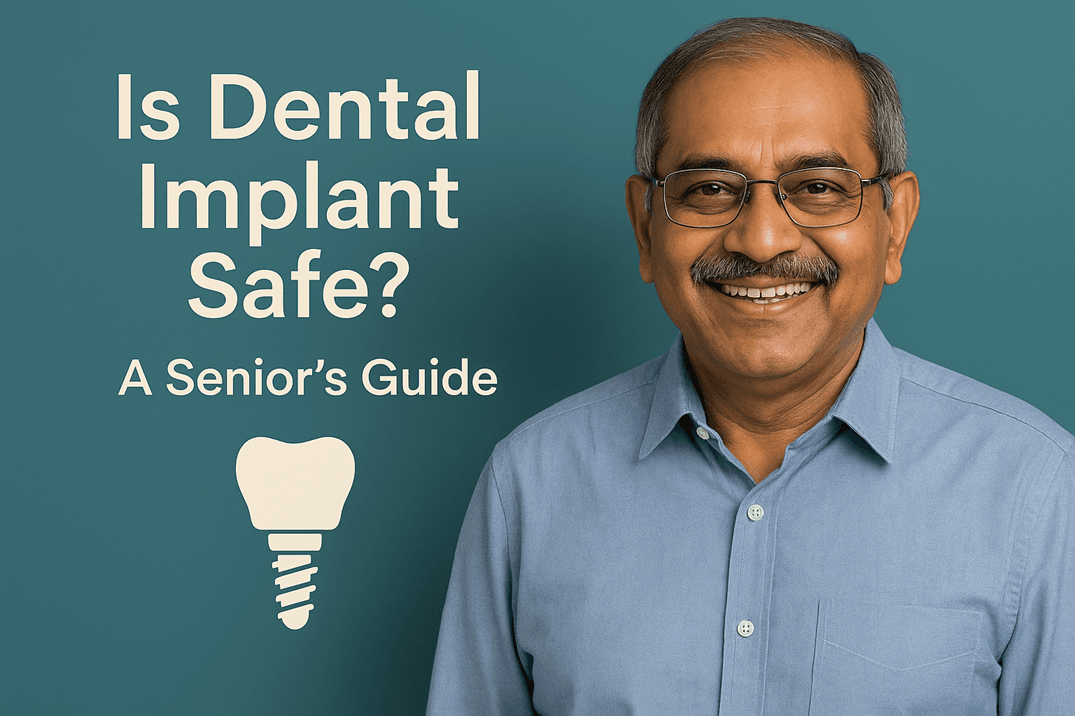Is Dental Implant Safe? A Senior’s Guide

Dental implants have transformed how we approach missing teeth, especially for older adults. But many people still ask the important question: Is dental implant safe? This guide dives deep into the safety, benefits, and risks of tooth implants for seniors and helps you make an informed decision.
Why Dental Implant Is Safe for Most Seniors
With modern advancements in surgical techniques and materials, dental implants are safe for many individuals—even those in their senior years. It’s not just about aesthetics; implants restore confidence, speech, and the ability to eat without discomfort.
1. High Success Rates Among Older Adults
One of the top reasons why dental implant surgery is safe today is due to its consistently high success rates. Studies show survival rates of up to 97.7% at 1 year, 96.3% at 3 years, and around 91.2% even after 10 years, making artificial tooth implant procedures a trusted solution.
2. Improved Quality of Life
Unlike dentures, dental implants function just like natural teeth. Seniors can chew better, speak clearly, and smile without hesitation. They also help preserve jawbone density, maintaining facial structure and preventing that sunken look often associated with tooth loss.
3. Long-Term Durability
With proper oral hygiene and regular dental check-ups, implants can last for decades—proving that dental implants are safe isn't just a question of surgery, but of lasting quality too.
Tooth Implant Side Effects & Things to Consider
While tooth implant side effects are generally rare, there are a few considerations seniors should weigh before undergoing the procedure.
1. Bone Loss and Density Issues
As we age, bone density naturally decreases, which can affect implant stability. In such cases, bone grafting may be required to ensure the artificial tooth implant is well-supported.
2. Medical Conditions and Medications
Certain health issues such as diabetes, osteoporosis, or cardiovascular disease can interfere with healing. Some medications may also increase risk. It’s essential to share your full medical history with your dentist to assess whether a dental implant is safe in your unique case.
3. Risk of Infection or Failure
Though rare, conditions like peri-implantitis (infection around the implant) can occur if hygiene isn’t maintained. This emphasizes the importance of post-surgery care.
4. Surgical Complications
Although dental implant surgery is safe, risks like nerve damage, implant misalignment, or sinus issues are possible—especially if the procedure isn’t handled by an experienced implantologist. Choosing a skilled and qualified dental surgeon is non-negotiable.
Reasons Not to Get Dental Implants
While the advantages of dental implants are plenty, there are some reasons not to get dental implants:
- Severe uncontrolled medical conditions
- Insufficient bone structure with no grafting option
- Inability to maintain oral hygiene post-surgery
- Heavy smoking, which can hinder healing
If any of these apply, your dentist might suggest alternative treatments.
So, Is Tooth Implant Safe for You?
Is a tooth implant safe? Yes—for most seniors who are in stable health and have adequate bone support. The decision should be based on a comprehensive dental and medical evaluation, including X-rays or scans, to confirm your candidacy.
Conclusion
So, is dental implant safe for seniors? In most cases, absolutely. With a thorough assessment, the right surgical team, and good post-care habits, dental implants offer a durable and natural-looking solution for missing teeth. They can greatly improve not just oral health but also emotional well-being.
Remember, while the advantages of dental implants are compelling, understanding the risks and preparing properly can make all the difference in achieving a successful outcome.

